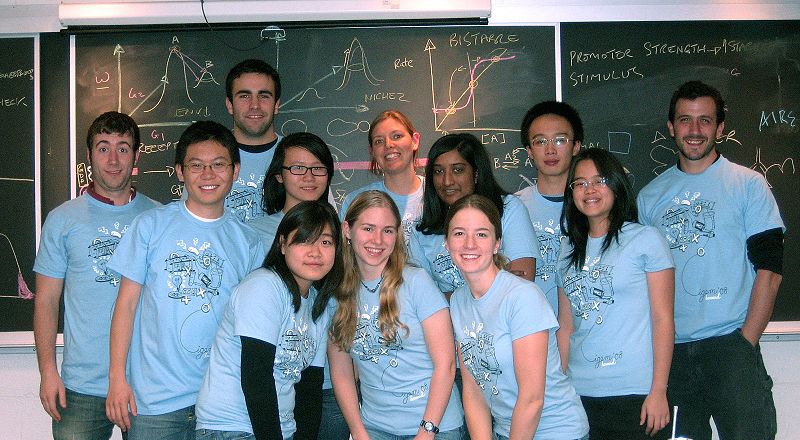News
SEAS Contact:
Michael Patrick Rutter
(617) 496-3185
CAMBRIDGE, Mass - November 21, 2008 - A team of undergraduates who engineered a bacterial biosensor with electrical output recently made some buzz at the 2008 international Genetically Engineered Machine (iGEM) competition held at the Massachusetts Institute of Technology (MIT).
The innovators won a gold medal for their outstanding contributions to the competition and were among the six finalists for the overall grand prize; they also won an area prize for the best energy project.
The honors mark the first time a group from Harvard has come home with an award at this international competition — where student teams compete to design and assemble engineered machines using advanced genetic components and technologies.
The Harvard entrants dubbed their winning entry “bactricity,” as they aimed to develop bacteria that could produce a detectable change in electric current in response to an environmental stimulus.
“You can think of their work as an early step to building a biochemical-electrical ‘hybrid,’” said the team’s faculty adviser Pamela Silver, professor of systems biology in the Department of Systems Biology at Harvard Medical School (HMS).The bacteria chosen for the task was Shewanella oneidensis MR-1 (S. oneidensis), a metabolically versatile, easy-to-mutate organism, perhaps best known for its use in “eating” toxic waste.
Grown under anaerobic conditions, S. oneidensis releases electrons, creating an electrical current. The Harvard iGEM team used a mutant strain of the bacteria with an electron transfer gene knocked out and replaced with a gene that turns on only in response to a stimulus, allowing the team to control the electrical output.
To monitor and harness that current, the budding synthetic biologists built a specialized microbial fuel cell (MFC) to “house” the bacteria. (In fact, last May, another team of undergraduates also employed MFCs, a chemical-to-electrical energy converting technology, to create a ‘dirt-powered’ light source suitable for sub-Saharan Africa.)
“The goal of this project was to use electricity rather than fluorescent proteins or enzymes as an output in response to a stimulus,” said Natalie Farny, head teaching fellow for Harvard iGEM 2008 and a graduate student in the Silver lab. “Electricity as an output can be recorded over time by a computer or can signal to a computer to perform another useful function, creating an interface between the microorganism and the machine.”
In short, the Harvard iGEM team’s marriage of the bacteria with a fuel cell demonstrated that building a biosensor that integrates directly with electrical circuits is possible. If the team’s project is further refined into a prototype, a potential application could include an interface that combines the attributes of bacteria (i.e., the ability to detect other chemicals and to readily adapt to its environment) with electricity and computation (that is, the ability to process information at high speeds).
Farny added that although generating a signal transmission and building a computer interface were the primary aims, the students also recognized that their research could represent an early step toward harnessing a very “green” form of bio-based energy.
IGEM was born in 2003 out of a monthlong course during MIT’s Independent Activities Period. The competition is driven by one fundamental question: Can simple biological systems be built from standard, interchangeable parts and operated in living cells? Judging by the way the event has evolved — this year 84 teams from 21 countries built and tested simple biological systems — the answer seems to be a resounding “yes.”
###
iGEM Team Members
Students
Thilini Ariyawansa
Joy Ding
Dan Gong
Meng Xiao He
Amy Li
Erica Lin
Lauren Schumacher
Anna Marie Wagner
Sam Workman
TFs
Remy Chait
Natalie Farny
Christina Agapakis
Jason Lohmueller
Kim de Mora
Advisors
Colleen Hansel
Peter Girguis
Christopher Marx
George Church
Jagesh V. Shah
Pamela Silver
Alain Viel
Ed Advisor
Tamara Brenner
Cutting-edge science delivered direct to your inbox.
Join the Harvard SEAS mailing list.

